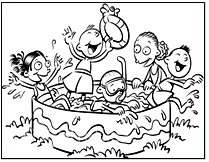题目内容
阅读理解。
One day, a farmer was walking along a road with his son Thomas. The father said, "Look! There's a
horseshoe. Pick it up and put it in your bag." Thomas said , "It isn't worth the trouble. " His father said
nothing but picked it up himself. When they got to a nearby town, they had a rest. There the farmer sold
the horseshoe and with the few pennies he bought some cherries.
The father and the son continued their way. The sun was well up in the sky, and there wasn't a house
or even a tree where they could have a rest. Thomas felt too thirsty to walk on. At this time, his father
dropped a cherry on the ground and Thomas picked it up quickly and ate it. After a while, his father
dropped another cherry and once again, his son lost some time in picking it up and putting it in his
mouth.
And so they went on. The old farmer dropped the cherries and the son picked them up. When
Thomas had eaten up all the cherries, his father said to him, "My dear son, if you had bent down earlier
to pick up that horseshoe. it would not have be en necessary for you to bend so many times for the
en necessary for you to bend so many times for the
cherries. Always remember the lesson that anyone who does not worry about the little things will find
that he cannot do the great things.
horseshoe. Pick it up and put it in your bag." Thomas said , "It isn't worth the trouble. " His father said
nothing but picked it up himself. When they got to a nearby town, they had a rest. There the farmer sold
the horseshoe and with the few pennies he bought some cherries.
The father and the son continued their way. The sun was well up in the sky, and there wasn't a house
or even a tree where they could have a rest. Thomas felt too thirsty to walk on. At this time, his father
dropped a cherry on the ground and Thomas picked it up quickly and ate it. After a while, his father
dropped another cherry and once again, his son lost some time in picking it up and putting it in his
mouth.
And so they went on. The old farmer dropped the cherries and the son picked them up. When
Thomas had eaten up all the cherries, his father said to him, "My dear son, if you had bent down earlier
to pick up that horseshoe. it would not have be
 en necessary for you to bend so many times for the
en necessary for you to bend so many times for the cherries. Always remember the lesson that anyone who does not worry about the little things will find
that he cannot do the great things.
1. Who picked up the horseshoe at last?
A. Thomas.
B. The old father.
C. Both the father and the son.
D. Neither the father nor the son.
B. The old father.
C. Both the father and the son.
D. Neither the father nor the son.
2. The farmer bought _______ with the money after he sold the horseshoe.
A. some food
B. some water
C. some cherries
D. some pennies
B. some water
C. some cherries
D. some pennies
3. When the son refused to pick up the horseshoe, the father _______.
A. felt very happy
B. didn't say anything
C. beat the son
D. became a little angry
B. didn't say anything
C. beat the son
D. became a little angry
4. The father dropped the cherries one by one, because _______.
A. he wanted his son to eat them all
B. he wanted his son to do more exercise
C. lie wanted to teach his son a lesson
D. he wanted his son to pick them up
B. he wanted his son to do more exercise
C. lie wanted to teach his son a lesson
D. he wanted his son to pick them up
5. From the story, we can learn that _______.
A. cherries are so delicious that most of us like to eat them
B. a horseshoe is so expensive that it can bring us a lot of money
C. if the boy wants to eat cherries, he must pick up the horseshoe
D. if we want to do some great things, we should start with some small ones
B. a horseshoe is so expensive that it can bring us a lot of money
C. if the boy wants to eat cherries, he must pick up the horseshoe
D. if we want to do some great things, we should start with some small ones
1-5 BCBCD

练习册系列答案
相关题目
| 阅读理解。 | |||
| On March 11th, 2011, an earthquake (地震) happened in Japan. More and more people worried about the problem of radiation. But how can we protect (保护) ourselves from radiation? Here are some suggestions (建议) for you.
| |||
| 任务一:根据短文内容,判断正(T)误(F)。 ( )1. Often open the windows and doors, so we can protect ourselves from radiation. ( )2. Often wash clothes with clean water, so we can protect ourselves from radiation. 任务二:根据短文内容,填上所缺的内容。 3. The underlined word "radiation" in Paragraph One means _____ in Chinese? 4. _____ can help us breathe (呼吸) better air. 任务三:根据短文内容,选择正确答案。 5. Which fruit can help us protect ourselves from radiation? A. Tomatoes. B. Cabbages. C. Oranges. D. Turnips. |

 re you in college at such a young age?” I asked jokingly.
re you in college at such a young age?” I asked jokingly. ted to realize her dream
ted to realize her dream . The more you laugh, the younger you will be.
. The more you laugh, the younger you will be.